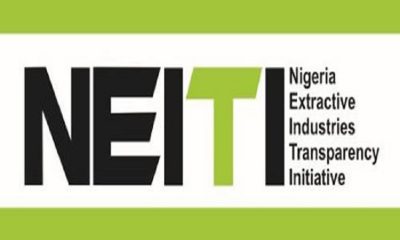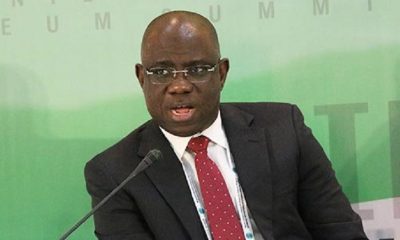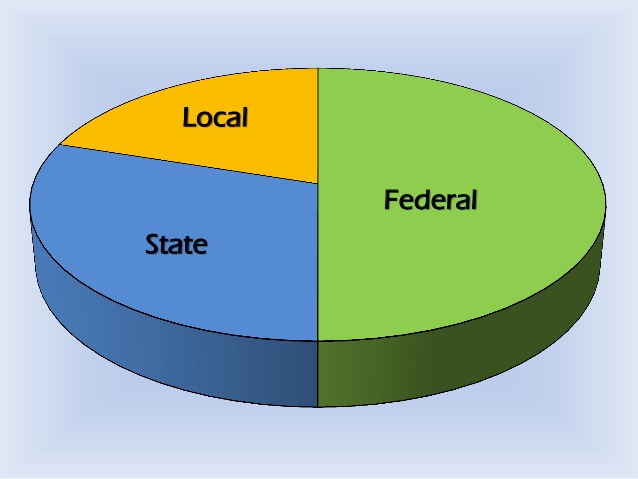Economy
FG Commits to Transparency in Oil, Gas, Other Extractive Industries

By Adedapo Adesanya
The federal government has reaffirmed its commitment to deepen implementation of the Extractive Industries Transparency Initiative (EITI) through the Nigerian chapter, NEITI.
The Secretary to the Government of the Federation, Mr George Akume, made this commitment in Abuja while receiving a delegation from the global EITI, in Oslo, Norway on a working mission to Nigeria.
Mr Akume praised Nigeria’s performance in the recent EITI assessment and progress recorded by the country in the implementation of the initiative between 2019 and 2022.
“NEITI is an agency of the federal government, and the present administration is very proud of its impacts in providing reliable information and data that have helped tremendously in shaping the ongoing reforms in Nigeria’s oil, gas, and mining sectors.
“We have also found NEITI reports to be very useful in the areas of revenue generation, resource mobilisation, blocking leakages in the system, and a dependable data resource in the country’s sustained war against corruption.
“I want to acknowledge the report of the EITI Validation of Nigeria and to assure you that the federal government is already working on the report.
“From our preliminary reviews, we have noted with excitement that many areas that Nigeria excelled in that report, and the areas that our country requires improvements. The government is fully aware that we were assessed on three major indicators- outcomes/impacts, transparency as well as stakeholders engagements,” he said.
Mr Akume said that he was elated that Nigeria excelled on outcomes and impacts with a score of 92 per cent, over 70 per cent on transparency disclosures which shows that Nigeria is benefiting enormously from the implementation of the EITI, but requires more work and improvements in the areas of stakeholders engagements where Nigeria scored above 50 per cent.
He applauded the EITI for courageously highlighting specific areas where the country needed to correct and improve before the next validation which will take place in January 2026.
He further stated that Nigeria through NEITI is working assiduously to provide action plans that will remedy the gaps identified by the validation report before January 2026 the stipulated time given to Nigeria to address noticeable areas of improvement in the oil, gas, and mining industry sector reforms.
At an earlier media briefing at the NEITI House, the leader of the delegation, the Deputy Head of EITI Secretariat, Mr Bady Balde, explained that the team was in Nigeria to communicate to stakeholders as well as the Nigerian government, the outcome of the last validation exercise for Nigeria and proffer support for post-validation planning.
“We are also here to strengthen the country’s call to working with NEITI for the reconstitution of the MSG and to appeal to the government that the disruption of the NEITI structure and the Secretariat will always not augur well for continuity, institutionalisation, and sustainability,” he said.
He lamented that the NEITI Act 2007 establishes an independent entity that is supposed to function in a multi-stakeholder nature and supervise EITI implementation in the country. Unfortunately, that entity has not functioned as intended in the last two years due to the vacancy and sustained vacancy of the NSWG itself which is supposed to oversee the EITI in Nigeria.
“We hope that at the end of the mission, we will have a clearer sense of the timeline and the process of how quickly the NSWG can be reconstituted. This is a significant area of concern because NSWG is at the core of the EITI process,” he reaffirmed.
Economy
NGX RegCo Cautions Investors on Recent Price Movements

By Aduragbemi Omiyale
The investing public has been advised to exercise due diligence before trading stocks on the Nigerian Exchange (NGX) Limited.
This caution was given by the NGX Regulation Limited (NGX RegCo), the independent regulatory arm of the NGX Group Plc.
The advisory became necessary in response to notable price movements observed in the shares of certain listed companies over recent trading sessions.
On Monday, the bourse suspended trading in the shares of newly-listed Zichis Agro-allied Industries Plc. The company’s stocks gained almost 900 per cent within a month of its listing on Customs Street.
In a statement today, NGX RegCo urged investors to avoid speculative trading based on unverified information and to consult licensed intermediaries such as stockbrokers or investment advisers when needed.
It explained that its advisory is part of its standard market surveillance functions, as it serves as a measured reminder for investors to prioritise informed and disciplined decision-making.
The notice emphasised that the Exchange will continue to monitor market activities closely in line with its mandate to ensure a fair, orderly, and transparent market.
“NGX RegCo encourages all investors to base their decisions on publicly available information, including a thorough assessment of company fundamentals, financial performance, and risk profile,” a part of the disclosure said.
It reassured all stakeholders that the NGX remains stable, well-regulated, and resilient, saying the platform continues to foster an environment where investors can participate with confidence, supported by robust oversight and transparent market operations.
“Our primary responsibility is to maintain a level playing field where market participants can trade with confidence, backed by timely and accurate information.
“This advisory is a routine communication, reinforcing that sound fundamentals, not speculation, remain the foundation for sustainable investment outcomes. We are fully committed to preserving the integrity and stability of our market,” the chief executive of NGX RegCo, Mr Olufemi Shobanjo, stated.
Economy
Stronger Taxpayer Confidence, Others Should Determine Tax Reform Success—Tegbe

By Modupe Gbadeyanka
The chairman of the National Tax Policy Implementation Committee (NTPIC), Mr Joseph Tegbe, has tasked the Nigeria Revenue Service (NRS) to measure the success of the new tax laws by higher voluntary compliance rates, lower administrative costs, fewer disputes, faster resolution cycles, and stronger taxpayer confidence.
Speaking at the 2026 Leadership Retreat of the agency, Mr Tegbe said, “Sustainable revenue performance is built on trust and efficiency, not enforcement intensity,” emphasising that the legitimacy and predictability of the system are more critical than punitive measures.
He underscored that the country’s tax reform journey is at a critical juncture where effective implementation will determine long-term fiscal outcomes.
The NTPIC chief stressed that tax policy must serve as an enabler of governance, and should embody simplicity, equity, predictability, and administrability at scale.
These principles, he explained, foster voluntary compliance, reduce operational friction, and strengthen investor confidence. He warned that ad-hoc adjustments or policy drift could undermine reform momentum, unsettle businesses, and deter investment, which thrives on predictable rules rather than shifting announcements. Structured sequencing, clear transition mechanisms, and continuous feedback between policymakers and administrators are therefore critical to sustaining reform credibility.
Mr Tegbe further argued that revenue reform cannot succeed in isolation. Achieving sustainable gains requires a whole-of-government approach, leveraging robust taxpayer identification systems, integrated financial data, efficient dispute resolution, and harmonised coordination across federal and sub-national levels. This approach, he said, reduces leakages, eliminates multiple taxation, and reinforces confidence in the system.
He noted that the passage of four new tax laws marks only the beginning of a broader reform agenda, describing the initiative as a systemic recalibration of Nigeria’s fiscal architecture, rather than a routine policy update.
He further asserted that the true measure of success will be the credibility of implementation, not the design of the laws themselves.
The NRS, he noted, functions as the nation’s “Revenue System Integrator,” with outcomes reflecting the strength of an interconnected ecosystem that encompasses policy clarity, enforcement consistency, digital infrastructure, dispute resolution efficiency, and intergovernmental coordination.
Economy
NUPENG Seeks Clarity on New Oil, Gas Executive Order

By Adedapo Adesanya
The National Union of Natural and Gas Workers (NUPENG) has expressed deep concern over the Executive Order by President Bola Tinubu mandating the Nigerian National Petroleum Company (NNPC) Limited to remit directly to the federation account.
In a statement signed by its president, Mr William Akporeha, over the weekend in Lagos, the union noted that the absence of detailed public engagement had naturally generated tension within the sector and heightened restiveness among workers, who are anxious to know how the new directive may affect their employment, welfare and job security, especially as it affects NNPC and other major operations in the oil and gas sector.
It pointed out that the industry remained the backbone of Nigeria’s economy, contributing significantly to national revenue, foreign exchange earnings, and employment.
The NUPENG president affirmed that any policy shift, particularly one introduced through an Executive Order, has far-reaching consequences for regulatory frameworks, Investment decisions, operational standards, and labour relations within the sector.
According to him, “there is an urgent need for clarity on the scope and objectives of the Executive Order -What precise reforms or adjustments does it introduce? “Its implications for the Petroleum Industry Act -Does the Order amend, interpret, or expand existing provisions under PIA?
“Impact on workers and existing labour agreements-Will it affect job security, conditions of service, Collective Bargaining agreements or ongoing restructuring processes within the industry? “Effects on indigenous participation and local content development -How will it affect Nigerian companies and employment opportunities for citizens?”
He warned that without proper consultation and explanation, misinterpretations of the Executive Order may spread across the industry, potentially destabilising operations and undermining industrial harmony that stakeholders have worked hard to sustain.
“Though our union remains committed to constructive engagement, national development and stability of the oil and gas sector, however, we are duty-bound and constitutionally bound to protect the rights and welfare and job security of our members whose livelihoods depend on a clear, fair and predictable policy framework,” Mr Akporeha further stated.
-

 Feature/OPED6 years ago
Feature/OPED6 years agoDavos was Different this year
-
Travel/Tourism10 years ago
Lagos Seals Western Lodge Hotel In Ikorodu
-

 Showbiz3 years ago
Showbiz3 years agoEstranged Lover Releases Videos of Empress Njamah Bathing
-

 Banking8 years ago
Banking8 years agoSort Codes of GTBank Branches in Nigeria
-

 Economy3 years ago
Economy3 years agoSubsidy Removal: CNG at N130 Per Litre Cheaper Than Petrol—IPMAN
-

 Banking3 years ago
Banking3 years agoSort Codes of UBA Branches in Nigeria
-

 Banking3 years ago
Banking3 years agoFirst Bank Announces Planned Downtime
-

 Sports3 years ago
Sports3 years agoHighest Paid Nigerian Footballer – How Much Do Nigerian Footballers Earn


















